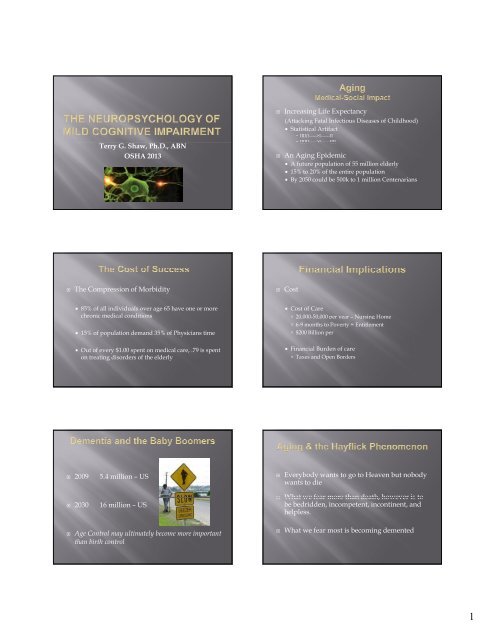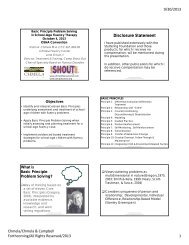(MCI) - Terry Shaw PhD, ABN
(MCI) - Terry Shaw PhD, ABN
(MCI) - Terry Shaw PhD, ABN
- No tags were found...
Create successful ePaper yourself
Turn your PDF publications into a flip-book with our unique Google optimized e-Paper software.
• Failed memory – “Oh No, I Got It”• Tip of the Tongue Phenomenon• The Hereafter Disease• Oldtimers Disease• Harbingers of Change or Normal Aging• Normal Aging• Forgets Parts• Remembers Later• Often Compensateswith notes orreminders• Able to attend toADL’s and SHS• Dementia• Forgets Whole• Rarely RemembersLater• Rarely Able toCompensate• Rarely able to attendto ADL’s and SHSIf you know you forgot, you’re probably OK• A Progressive Deterioration of Mental Abilities due toOrganic Disease of the Brain• Aging is not a Disease• There are, however, many diseased that do causeDementia• Diagnosis Usually by Default• Early Diagnostic Classifications• Treatable Reversible (Acute Confusional States)• Treatable/Irreversible (Static Damage)• Untreatable/Irreversible (Progressive Deterioration)• Acute Confusional StateNormal AgingAcuteConfusionalStateTreatableReversibleTreatableIrreversible Global Cognitive Decline of rather sudden onset Fluctuating Course (ex. sundowner)R t H lth Ch /S Recent Health Change/Surgery Medication Changes Exposure to Toxins Recent Sociologic Change (Stress Related)UntreatableIrreversible2
• D Drugs• E Emotional• M Metabolic• E Eyes/Ears• N Nutritional• T Trauma• I Infection/Increased Intracranial Pressure• A Athrosclerotic Changes• Stroke• Space Occupying Lesions• Some Brain Tumors/Brain Radiation• Moderate to Severe Traumatic Brain Injuries• Untreated Causes of Acute Confusional States(ex. T3-4, NPH)• Cortical Dementias• Alzheimers• Vascular Dementia (MID/Lacunar)• Picks/FTD• Some Moderate to Severe Head Traumas• Alcoholic/Korsakoff’s li Dementia• Subcortical Dementias• Lewy Body (DLBD)• Prion Diseases (PrD)• Parkinson’s Dementia• Huntingtons Disease• HIV Dementia• Most Common• Received Most Research• Diagnosed by Default• Confirmed by Autopsy• Bad Genes• Chromosomes ? 14 – Familial Alzheimers Disease FADPSI Mutation 21 – FAD/Downs Syndrome 1 - Presenilin 2 19 – Risk Gene - ApoE – FAD• Only Accounts for a Small Percentage3
A. Evidence of modest cognitive decline…in one or more:B1. Concerns of the individual, a knowledgeable informant, or the clinician that there hasbeen a modest decline in cognitive function and2. A decline in neurocognitive performance, 1-2 standard deviations below appropriatenorms…on formal testing or equivalent clinical evaluationCognitive deficits are insufficient to interfere with independence, butgreater effort…may be requiredC. Cognitive deficits do not occur exclusively in the context of a DeliriumScottish Psychiatrist R. E. Kendell• “Classification is the art of carving nature at thejoints; it should imply that there is indeed ajoint there, that one is not sawing throughbone”D. Cognitive deficits are not primarily attributable to another mentaldisorder (e.g., MDD, Schizophrenia)• Bondi et. al (1995)• Verbal learning and memory in nondemented olderadults with e4 was qualitatively similar to that ofearly stage AD patients• Follow-up revealed that 6 of 14 subjects with the e4allele developed AD, whereas none of the 26 subjectswithout an e4 allele demonstrated any significantdecline• Not Everybody with <strong>MCI</strong> will convert to Dementia• Rates range from 80-90% conversion to dementia to40% reverting to normal.• Why such variability• Different reasons for <strong>MCI</strong>• Different psychometric definitions/criteria/tests• Regression to the mean• <strong>MCI</strong> as a risk factor rather than early ADAcute Confusional Stateand/orLoss of Cognitive ReserveNormal<strong>MCI</strong> 11% per yearAging9% per yearDementia<strong>MCI</strong> is thought to be a condition of intermediate symptomology between normal aging and dementia.Rationale for impairment derived from assumption that the sooner one intervenes in a degenerative processlike dementia, the more likely the damage done to the CNS can be prevented. <strong>MCI</strong> is a transition stagethought to be more amenable to treatment .6
• Biomarkers• APO e4• Hippocampal/entorhinal volume• PIB positive imaging• Higher CSF total tau and lower beta amyloid 42• C-Reactive Protein?• Poor delayed recall on memory tests, especially with poor %retention• Declining cognitive performance on repeat testing (repeat exams)• High anxiety and/or apathy-Depression• Lower Education• Multiple Trajectories• Depression (T/R)• Mtbli Metabolic Dit Disturbance (T/R)• Traumatic Injury (T/I)• Cerebrovascular disease (T/I)• Degenerative process (U/I)• Loss of sense of Smell?Memory Impaired<strong>MCI</strong>Other ImpairmentsEtiologiesDegenerative Vascular PsychiatricAmnestic <strong>MCI</strong>Non Amnestic <strong>MCI</strong>Single Domain AD DepressionAmnestic <strong>MCI</strong>Multiple Domain AD/DLB VaD DepressionSingle Domain Multiple Domains Single Domain Multiple DomainsSingle Domain FTDNonamnestic <strong>MCI</strong>Multiple Domain DLB VaDResearch thus far has not been all that supportive of the progression to specific dementiasCompound Progression Rate Result---------------------------------------------------------------Donepezil/Vitamin E 16%/year Partially PositiveRivastigmine 9%/year NegativeGalantamine 5%/year Negative• Physical Exercise – several studies have foundreduced risk of <strong>MCI</strong> with moderate exercise• Physical Exercise – Results are mixed butphysical activity may also help cognition inindividuals with <strong>MCI</strong>Rofecoxib 5%/year Negative7
• Core Underpinnings (enriched vs. impoverished environments)• Nun Study – Higher cognitive activity in early lifereduces risk for dementia.• Bronx Aging Study – Found that increased cognitiveactivity (not physical) lowered risk of amnestic <strong>MCI</strong>over 5 years• No known studies of whether justrecommending cognitive or leisure activityhelps patients (follow-through).• There is some research on the efficacy of directintervention and rehabilitation strategies• Interventions help the domain trained in short run• Questions of real world impact/generalizability• Research using computer programs ongoing• Problem is compliance outside the office (homework)• Demographic Risk Factors• Older, Poorly Educated, African American• Disease Risk Factors• CAD, Metabolic, Psychiatric, i Renal, Polypharmacy• Negative Lifestyle Factors• Smoking, Heavy Alcohol Consumption• Diagnostic Goals• Identify Patients with Reversible Causes• Alleviate Worry in Normal Patients• Identify <strong>MCI</strong> (At Risk Population) for Intervention• Allow Identified Patients/Family to make Long-Term Care Plans• Protective Factors• Mediterranean Diet, Physical Activity, CognitivelyStimulating Activity• Treatment Recommendations• NormalNutrition/Neurobics• <strong>MCI</strong>Nutrition/Neurobics/Medication• Dementia(Without Adequate Work-up)Rule Out Treatable Causes of Impairment• Dementia(With Adequate Work-Up)Slow Down Progression, Address PlacementOptions, Caregiver Needs8



